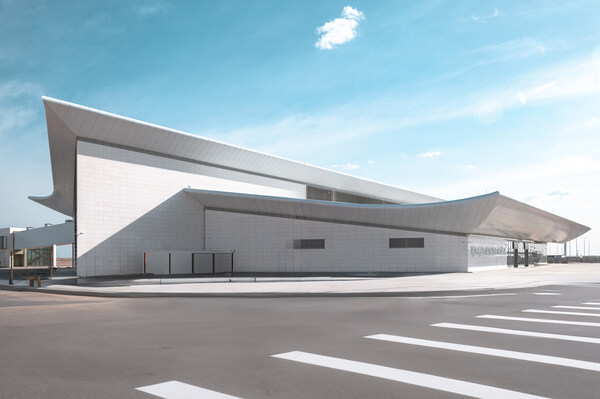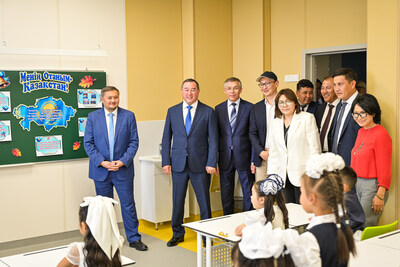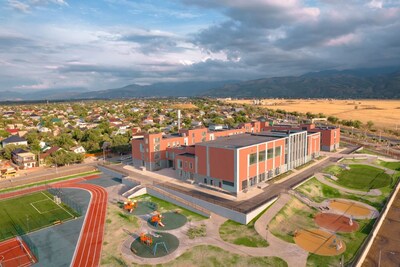Kazakhstan tennis head Bulat Utemuratov: from ATP 250 triumph to future successes
Published December 10, 2024
by Lorenzo Ciotti

In an interview with Tennis World USA, the Kazakhstan Tennis Federation President Bulat Utemuratov gave an in-depth analysis of the growth of tennis in his country, highlighting the incredible increase in participation, the development of new infrastructure, and the number of tournaments hosted. These results have been achieved thanks to targeted and sustainable investments over the years.
Utemuratov also shared his opinion on the current state of tennis and Elena Rybakina’s season, noting that the former Wimbledon champion is a very strong person mentally and that he is confident of her full comeback in 2025.
Mr. President, how do you evaluate the work done by the Kazakhstan Tennis Federation in 2024?
“This year was extremely important and successful for the Federation. For the first time, we hosted an ATP 250 tournament in Almaty instead of Astana, which was crucial for both the development of the tournament and the evolution of tennis in Kazakhstan. Almaty is the birthplace and capital of tennis in our country, with the largest number of fans and numerous tennis tournaments and centers, so it was important for us to establish a connection with local tennis fans. A tennis festival and various children’s activities were organized at the tournament venue, where everyone could find something to their liking.
The event, attended by over 50,000 people, allowed us to once again prove that tennis in Kazakhstan is world-class and all our hard work in organizing the tournament and preparing the venue paid off. It is important to note that we managed to attract six players from the top 30 in the world, including Frances Tiafoe (ATP 16), Alejandro Tabilo (ATP 22), Karen Khachanov (ATP 23), with Khachanov eventually winning the tournament.
About Kazakhstani players, they also demonstrated a good level of play throughout the year. Elena Rybakina won the WTA 500 in Brisbane, Abu-Dhabi, and Stuttgart. Yulia Putintseva won her first grass singles title at the WTA 250 tournament in Birmingham. The country’s best doubles player, Anna Danilina, won the WTA 125 tournament in Bari, the WTA 500 in Guadalajara and the WTA 1000 in Wuhan. Zarina Diyas won the ITF 50 tournament in Turkey. Zhibek Kulambayeva won doubles titles at ITF 50 tournaments in Poland, Argentina and Thailand and at ITF 75 in Brazil. Alexander Bublik achieved his career-best ATP singles ranking of 21 during the season.
Our youth tennis is already a recognized force in Asia. In 2024, Amir Omarhanov, Zangar Nurlanuly, Damir Zhalgasbay, Daniyal Rakhmatullayev, Sonya Zhiyenbayeva, Asylzhan Arystanbekova, Eva Korysheva, Sofia Isakova, Polina Slepstova and others achieved good results. They were very successful at the junior Australian Open, Roland Garros, Wimbledon and US Open and have already started winning in adult competitions.

Kazakhstan girls’ team – Eva Korysheva, Albina Kakenova, Yaroslava Shvedova (captain of the junior tennis team), Ariana Gogulina
Which projects achieved the most notable milestones this year?
“Young trainees of the Kazakh tennis school have already had a significant impact on the international level. For example, it is worth noting the results of the Kazakhstan U-14 team. In 2022, Zangar Nurlanuly, Damir Zhalgasbay and Daniel Tazabekov led the Kazakhstan U-14 team to the World Championship for the first time in the history of Kazakhstani tennis.
At that World Championship, our junior team took a sensational fourth place, defeating the reigning world champions Italy and losing to the USA and Germany. In 2023, the Kazakhstan U-16 team, consisting of Amir Omarhanov, Zangar Nurlanuly and Damir Zhalgasbay, also reached the final of the World Championship for the first time in the history of Kazakhstani tennis, defeating the five-time world champions Australia and entering the top 10 of the best teams in the world.
Not only: Kazakhstan U-16 women’s team, consisting of Polina Slepstova, Inkar Dyusebay and Anastasia Krymkova defeated the Australian team and reached the World Championship finals for the first time in their category, entering the top 10 best teams in the world, in 2023.
In 2024, Kazakhstan juniors Amir Omarhanov, Daniyal Rakhmatullayev, Sonya Zhiyenbayeva and Asylzhan Arystanbekova played in all the junior Grand Slam tournaments. Recently, the 2024 Davis Cup junior finals were held in Antalya. Kazakhstan’s Zangar Nurlanuly, Damir Zhalgasbay and Daniel Tazabekov finished fifth. to. In the group stage and the fifth-place match, the Kazakh team defeated four-time junior Davis Cup winners France twice.”
What are the next goals that the Kazakhstan Tennis Federation would like to achieve in the next two-year period 2025-2026?
“We are very optimistic about hosting more ATP tournaments in Kazakhstan. After four ATP 250 tournaments in Astana and Almaty, as well as the ATP 500 tournament in 2022 with the world’s best players such as Novak Djokovic, Carlos Alcaraz, Daniil Medvedev and Stefanos Tsitsipas, we are confident that we are ready to host ATP 500 tournaments in Kazakhstan on a regular basis.
ATP representatives and players themselves have noted the high level of organization of our tournaments: for example, this year’s Almaty Open received the highest player ratings, becoming one of the top 3 tournaments of the year based on more than 30 criteria, including court quality, locker room comfort, spectator support, atmosphere and more.
We are considering two ways to raise the status of the tournament. The first is to acquire a new license for an ATP 500 tournament; the second is to upgrade our current ATP license 250 by acquiring another similar license. We have already discussed this option with ATP and participated in a tender to upgrade our license in 2023.
ATP was ready to consider options in February and April, but due to weather conditions, it is impossible to organize outdoor tournaments in Kazakhstan in February and April, due to the specific tournament schedule, it is difficult for players to travel from Europe to Asia and back to Europe, so preference was given to offers from other countries. However, our offer was very strong and we positioned ourselves as one of the key candidates to obtain an ATP 500 license in the future.
Among other goals, I would like to highlight three more: there should be eight Kazakhstani juniors (four boys and four girls) in Grand Slam tournaments, at least 13 Kazakh players (five women and eight men) should play in adult Grand Slam tournaments, and three more tennis centers should be built in Kazakhstan.”

Kazakhstan boys’ team – Sergey Kvak (captain of the junior tennis team), Daniel Tazabekov, Damir Zhalgasbay, Zangar Nurlanuly
Let’s talk about Elena Rybakina. She has suffered many physical problems during the season, in addition to the breakup with Stefano Vukov. I consider her season very positive: Mr. President, have you had the chance to speak with Elena, to understand her state of mind?
“Elena started the year well, winning the Brisbane International, the Abu Dhabi Open and the Stuttgart Open, and reaching the finals of the Miami Open and the Qatar Open. She also achieved great results at Roland Garros and Wimbledon, but unfortunately, illnesses and injuries interrupted her season. I have spoken with Elena several times: she is focused on her comeback and is more determined than ever. She is one of the most committed tennis players I have ever met, who is committed to getting back in top shape and competing at the highest level”.
Overall, what advice would you give to Elena, in view of the end of the season and the upcoming 2025 tennis season?
“As you know, Elena has started working with a new coach. I believe this will give a new impetus to her development, especially considering the vast experience and outstanding reputation that Goran Ivanisevic has in the tennis world. Goran had a brilliant playing career and has many years of experience coaching top players, including Novak Djokovic. I would advise Elena to focus on her recovery and return to the court, which she is already doing. She has had a difficult time, but I hope the worst is behind her, and Elena is a very strong person mentally. I am confident that everything will fall into place and I am very optimistic about Elena’s prospects in 2025.”
Let’s talk about numbers: the work done by the Kazakhstan Tennis Federation has produced incredible results, but which numbers are the most satisfying for you?
“I see the results of the Federation’s work over the past 17 years very positively. During this time, more than $150 million has been invested in the development of tennis in Kazakhstan. This has helped develop tennis at the grassroots level, which is the most important part of creating a thriving tennis ecosystem, and the numbers speak for themselves:
In 17 years, 38 tennis centers with 364 hard and clay courts have been built across Kazakhstan.
The average cost of court rental has been reduced from $50 per hour in 2007 to $10 per hour.
300 coaches and 500 instructors have been trained to work with children from an early age.
More than 200 tournaments are held annually.
All this has led to real and tangible results: the number of children playing tennis in Kazakhstan has grown from 900 in 2007 to 30,000 today, and 3,500 of the most talented players receive free training, equipment and support from the Federation to participate in tournaments.”

Bulat Utemuratov with Alison Lee, Executive Vice President of the ATP
What would you say to young people who are approaching tennis for the first time?
“In my childhood, tennis was not a popular sport in Kazakhstan, as there were very few courts and coaches in the country. I was interested in boxing, football and table tennis, and only as an adult did I start playing tennis. Now that we have the necessary infrastructure and support, tennis has become more accessible than ever, and I would like to encourage all young people to try it.
Of course, to achieve serious results, you need to fully dedicate yourself to tennis, and this sport can give a lot in return. Tennis offers great physical benefits, helping children develop speed, strength and endurance. It is also incredibly intellectual, requiring concentration, tactics and versatility, and it provides children with very valuable and useful life skills.
We already have many talented and hardworking young players who have achieved success in junior tennis, proving to everyone that hard work pays off. For example, in Kazakhstan, there are several boys and girls who are among the best in Europe and Asia in their categories. Among them are Amir Omarhanov, Zangar Nurlanuly and Sonya Zhiyenbayeva. Amir Omarhanov made history by winning the Asian Championship for players under 18 in 2023. In the finals of the Davis Cup Juniors in 2023, he did not lose a singles match and defeated a top 10 player, Federico Cina of Italy.
In 2024, Amir reached the quarterfinals of the Australian Open Juniors and the semifinals of the Roland Garros Juniors in doubles, and achieved a world ranking of 12 for players under 18, which no other Kazakhstani player had achieved before him. Currently, Amir is ranked 15th in the world among juniors. Another notable success is that of 16-year-old Zangar Nurlanuly, who is ranked 76th in the ITF Junior Rankings. This year, Zangar won two major ITF Junior titles: J200 in Shymkent and J100 in Izmir.
Sonya Zhiyenbayeva ends the year ranked 16th in the world junior rankings, equaling the record of Amina Rakhim of Kazakhstan, who was also ranked 16th in the ITF Junior world in 2006. The 18-year-old Sonya won the prestigious ITF Juniors J300 tournament in Spain this year and, in doubles with another Kazakhstani player, Asylzhan Arystanbekova, became champion of the Category 1 tournaments in Cairo and the Category 2 tournaments in Italy.
Sonya has also made her mark on the adult women’s tour, winning two ITF World Tennis Tour W15 trophies in Spain and Turkey. In the WTA rankings, Sonya is currently ranked 633. These results mean a lot, not only to the players themselves, but also to the entire younger generation in Kazakhstan, who see their peers succeeding on the court and start to believe that they too can do it and that their opportunities are endless.”
What are, in your opinion, the critical issues that the ATP and WTA should work on to accommodate tennis players who say that the annual tournament schedule is too busy?
“The tournament schedule is really demanding; players have to travel a lot, have time to acclimatize to new conditions and, if necessary, adapt to different types of surfaces. Although many tournaments are now held in two weeks, players rarely have a break to recover physically and emotionally. Also, a significant issue is that many players in the top 30 also participate in exhibition matches during the tournament schedule and in pre-season preparation. Although their motivation is understandable, this does not allow them to recover properly and there is a high risk of injury.”
SOURCE: Tennisworldusa.org



















